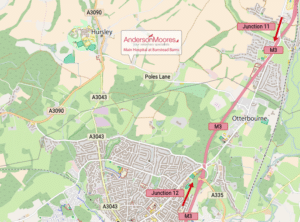We see all TPLO cases within 48 hours*
NEW FIXED PRICE
What to expect during your visit
Your initial consultation will be with the clinician who will be in charge of your pet’s care. These consultations can last up to an hour so there is plenty of time for detailed discussion of your pet’s medical history, a thorough examination of your pet, a discussion of treatment options and an opportunity for you to ask any questions.
Your clinician will have received a report from your vet but will ask you detailed questions, to get a full understanding of your pet’s condition. We will make sure you fully understand what is involved in your pet’s care, and you will receive an estimate of costs. This estimate may be broad until we have fully investigated your pet’s condition, but we will keep in touch daily to update you during your pet’s stay.
There is no obligation to proceed with any investigations or treatment so you can always have a think about things and return another day.
Please note: You will need to bring all of your pet’s current medications with you, but you don’t need to bring pet food as each animal will have their nutritional requirements assessed and a feeding plan created. Also, for infection control reasons we do not accept bedding or toys from home. We try to make their stay with us as calm and relaxed as we possibly can and all animals have a mattress and bed.
We would like to make you aware that our entire site inside and outside is a no smoking site for the safety of people and pets.
Updates
While your pet is with us, we will keep you regularly updated on their progress including a morning update from one of our vets, or a kennel nurse. You will also receive an update from the clinician in charge of your pet at frequent intervals during their stay. If your pet has to stay overnight for further investigation, observations or treatment, we have vets and a dedicated team of nurses on the wards and awake overnight.
Sometimes dogs or cats end up staying with us for several days and we can arrange a quiet time for you to come and visit your pet. For short stays, visits may confuse your pet as they may think they are coming home early. We do not have set visiting times but we try to organise visits at times that will be least disruptive to the clinical activities in the hospital.
Who will look after my pet?
All of our clinicians work within large teams and you may see one of our Specialist clinicians or a member of their team, many of whom are training to be the Specialists of the future. Regardless, you can rest assured that all of the pets in our care are assessed and discussed with the team to ensure they always receive exceptional clinical care.
Many of our nursing team have undergone further advanced training and they are supported in our wards by animal care assistants who are responsible for the non-medical aspects of your pet’s care. They take your dog out regularly throughout the day, and with all pets spend time encouraging them to eat when necessary and generally providing a lot of hands-on love.
Dogs and cats are cared for in separate wards in their own kennels. Dogs are kept in large kennels with a mattress and bed and they are regularly walked throughout the day and night in our woodland walk or other grassy areas, depending on their needs. Cats also have padded beds and their litter trays are cleaned regularly.
Overnight your pet is cared for by a veterinary nurse with a vet on site to deal with questions relating to their care. For each discipline, we have a vet on call who can manage any concerns raised by the onsite vet.
Going Home
When your pet is ready to go home, one of our team will contact you to arrange a discharge appointment (before 6:30pm on weekdays and before 4pm on Saturdays). At the appointment, a clinician or nurse will go through the discharge instructions with you and explain any ongoing medications or treatment that your pet needs.
We care passionately about the care your pet receives and the service we provide you with, as owners. We would love you to keep in touch to let us know how your pet is after they have been discharged. We always enjoy hearing the stories through social media, or if you have some feedback you would like to share do get in touch.
Brucella canis
In the last few years, the number of dogs diagnosed with Brucella canis infection in the UK is increasing. Of those diagnosed, there is a higher proportion of cases in dogs that have come from or travelled to endemic countries, outside of the UK.
- Clinical signs seen in in dogs are:
- Reproductive issues
- Infection of the intervertebral discs
- Rarely joint problems, eye problems or vague signs of lethargy and fever
- No signs (asymptomatic)
- Zoonotic (spread to humans)
- Signs in humans are non-specific and flu-like
- Transmission is via exposure to bodily fluids especially reproductive fluids but the overall risk is low
Due to the incidence of Brucella canis infection in dogs and the number of higher risk procedures performed at AMVS; e.g., sampling of the urine, spinal fluid, joint fluid, spinal and joint surgeries, we are routinely testing travelled dogs that have not been tested for Brucella canis prior to referral.
We will perform rapid, patient-side blood tests in all travelled dogs as they are admitted to the hospital. Based on these results, our clinical suspicion, and the stability (how sick they are) of your pet we will either:
- Continue your pet’s care as normal
- Discharge your pet while pending further results
- Hospitalise your pet to provide supportive care while pending further results.
These changes are being made to reduce the risks to other pets, owners and staff.
If you have any questions about our policy and/or Brucella canis please speak with the clinician during your pet’s consultation.
To read more in our Q&A information sheet please click here.
Customer Accessibility
Accessible facilities
- Disabled parking bay outside reception
- Emergency parking bay outside the hospital
- Wheelchair accessible client areas including reception, consulting rooms and a disabled WC



